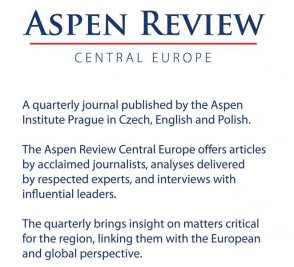There is no doubt that the current situation in Ukraine is the most serious security crisis in Central and Eastern Europe since the fall of the Iron Curtain. Turbulent events just outside the V4 borders were also widely discussed at the recent Aspen Annual Conference 2014 (you can see the event's outcomes HERE). Naturally, this issue will be in the spotlight of the upcoming Aspen Review titled Central Europe Re-enters History, which is to be published in the end of July.
"The EU needs to look again at its relationship with Russia. A relationship is unavoidable; but it should be treated exactly like that: an unavoidable necessity, to be handled with a certain coolness," writes Sir Robert Francis Cooper in his article The Shock of Ukraine, the first piece of the Review. We bring you the article The Shock of Ukraine so you can read it already today  .
.
The new Aspen Review issue will bring more intriguing analyses of the current situation in Ukraine by renowned authors. You can look forward to an interview with Roman Szporluk by Filip Memches, followed by an insight in the beliefs of Russian elites by Peter Pomeranstsev and a discussion of the Russian minority's current role in Estonia by Martin Ehala.
Aspen Review Central Europe is a quarterly published by the Aspen Institute Prague. The journal’s main goal is to present thought-provoking ideas and a wide spectrum of opinions to a broad Central European and global audience. It covers an extensive range of topics, with sections devoted to Politics, Economy, and Culture, and includes interviews with prominent personalities and thinkers. The Review is published in English.

